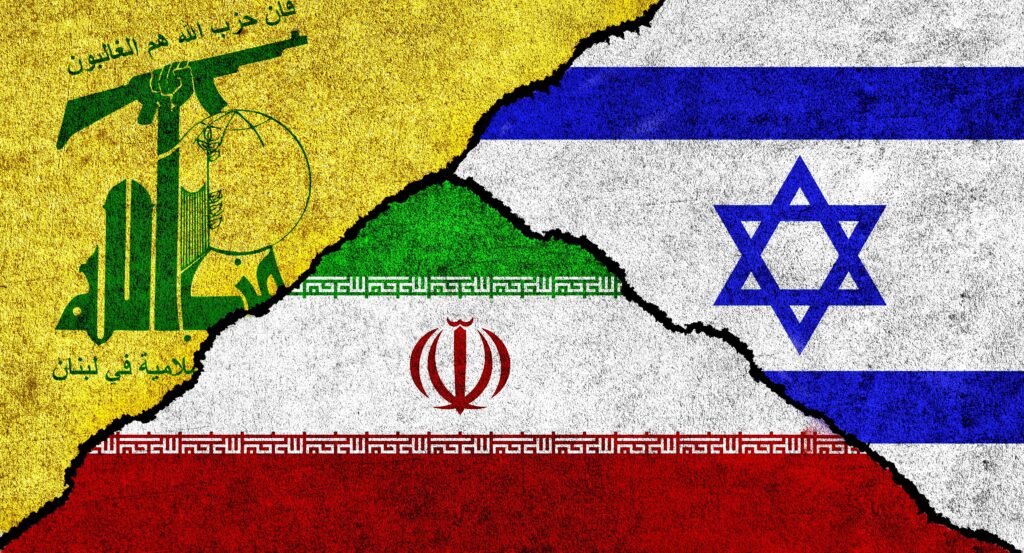Exporting the Islamic Revolution
As Israel pushes deeper into Gaza and prepares for war with Hezbollah in the north, “Iran’s campaign against the Jewish state and the U.S. is approaching an inflection point,” warns Seth Cropsey in the WSJ. Mr. Cropsey, president of the Yorktown Institute, warns that a new strategy is needed in Jerusalem and D.C.: each needs to recognize Tehran as the true enemy.
Israel’s greatest failure since Oct. 7 is political. Much of the world considers the massacre another round of Israeli-Palestinian violence, not an Iran-orchestrated attack. Since 2021 Hamas has been a full-fledged member of what Tehran calls its “axis of resistance,” a proxy network that spans the Levant, Lebanon and Yemen.
Each proxy has a distinct character, but all are united in their hatred of Israel and the U.S. From 2021 on, Hamas, Palestinian Islamic Jihad and Hezbollah have reportedly planned and coordinated operations jointly from a nerve center in Beirut with direct Iranian Revolutionary Guard Corps supervision.
An Iran with proxies across the Levant, and in time the Arabian Peninsula, would be a bona fide great power capable of competing with Europe, Russia, China and India for Eurasian influence. It would be able to challenge America directly in military, diplomatic and economic terms. Eurasia has never been able to secure itself absent a stable Middle Eastern order.
Even ignoring its oil flows, the Mideast is the nexus point between Europe and Asia and therefore the linchpin of the Eurasian economic power on which the U.S. depends and a key transit route for U.S. military forces.
Iran Manipulating the U.S.
At issue here is the degree to which Iranian manipulation of the U.S. has already succeeded. “Washington has failed to respond seriously to an Iranian attack since Oct. 7, holding to the lie that Tehran isn’t in control of an axis it quite obviously is,” continues Mr. Copsey.
The result is American paralysis, which will only intensify as Iranian pressure increases.
Proxies Functioning like an Empire
Instead of telegraphed American airstrikes or the Israeli Octopus Doctrine of punishing Iranian proxies, both nations must work to collapse Iranian power in Iraq, Syria and Lebanon.
Israeli struggle as a key to greater geopolitical stability, warns Seth Cropsey.
Washington treats (Israel) as merely another Gaza war. Attacks by Iran-backed militants in the Red Sea and on U.S. bases in Iraq and Syria are considered aftershocks of the Israel-Palestinian conflict. This plays into Tehran’s hands.
President Joe Biden and his administration has just been delivered a significant message, outlines Amber Duke in Spectator. Biden needs to be competitive in Michigan in the upcoming general election.
Biden beat Trump by about three points in their 2020 match-up, and the Arab American community accounted for 5 percent of the vote. Biden now has to decide if he will renege on his long career of supporting Israel and support a permanent ceasefire for the sake of re-earning these votes.
His other option, explains Ms. Duke, is to hope he can pick them up elsewhere — not an easy task with his dismally low approval rating and his two weakest issues, immigration and the economy, sitting at the top of voters’ minds.
A Quandary
Democrats are facing a potentially fatal drawback in their progressive approach to coalition-building: that is cobbling together as many minority interest groups as possible.
There was bound to be a point where appeasing all of them was not feasible, and Biden now finds himself being forced to govern by heckler’s veto.
If he gives in to the pro-Palestinian contingent of the left, which has been only further elevated by Squad members in Congress, could his support among the Jewish population — traditionally heavily Democratic voters — dwindle?
Recent polling already suggests that black and Hispanic voters are pulling support from Biden as they feel he has taken them for granted. It was only a matter of time before other identity-based voting groups followed the trend.
Read more about bending foreign policy.






